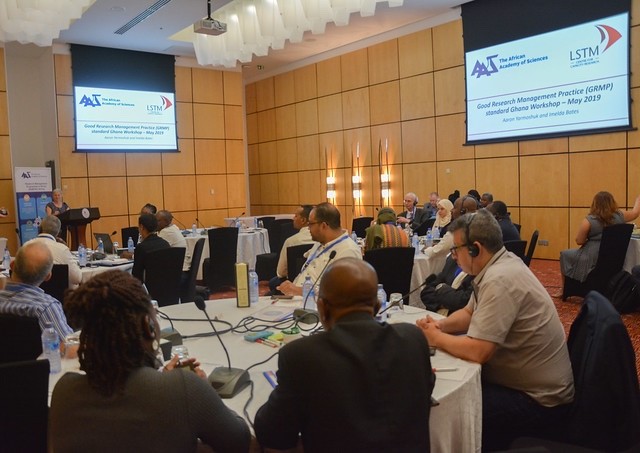AESA PROGRAMMES
- Building R&D Infrastructure
- Developing Excellence in Leadership, Training and Science in Africa (DELTAS Africa)
- Human Heredity and Health in Africa (H3Africa)
- Africa’s Scientific Priorities (ASP)
- Innovation & Entrepreneurship
- Grand Challenges Africa
- Grand Challenges Innovation Network
- Rising Research Leaders/Post-Docs
- AESA RISE Postdoctoral Fellowship Programme
- African Postdoctoral Training Initiative (APTI)
- Climate Impact Research Capacity and Leadership Enhancement (CIRCLE)
- Climate Research for Development (CR4D)
- Future Leaders – African Independent Research (FLAIR)
- Critical Gaps In Science
- Clinical Trials Community (CTC)
- Community & Public Engagement
- Mobility Schemes: Africa-India Mobility Fund
- Mobility Schemes: Science and Language Mobility Scheme Africa
- Research Management Programme in Africa (ReMPro Africa)
- Science Communication/Africa Science Desk (ASD)
- Financial Governance: Global Grant Community (GGC)
- AAS Open Research
- CARI Programmes
- Evidence Leaders Africa (ELA)

News
What defines good research management practice?

163
What defines good research management practice?
Cutting edge research is gaining momentum across Sub-Saharan Africa. However, there are critical gaps within research organizations such as clear research strategies and priorities, and fragmented research policies against a backdrop of competing funder priorities.
The African Academy of Sciences (The AAS) Research Management Programme in Africa (ReMPro Africa) is developing an innovative standard in Good Research Management Practice (GRMP) for African academic and research institutions to assist them with benchmarking and improving their research ecosystems. Research management is a core component of any research ecosystem, yet it is either underappreciated or not well understood in Africa. The GRMP standard would ensure institutions enact effective policies and procedures regarding research integrity and governance, data protection and intellectual property and ethics, among others.
The standard is a self-assessment tool for African research institutions to benchmark and improve their research management systems.
The AAS is developing the standard in consultation with leadership from research and academic institutions, representatives of funders and research management professional associations whose discussions to date have defined and developed an initial skeletal framework for a Good Research Management Practice (GRMP) standard.
The framework first developed at the launch of ReMPro Africa in Nairobi in February 2019 was presented at the recently ended Global Stakeholders Workshop held in Accra, Ghana, on 20-22 May. This means the standard has been discussed in East and West Africa. The AAS engaged the Centre for Capacity Research at the Liverpool School of Tropical Medicine to facilitate the works.
The framework identifies eight key components that should be included in the standard:
GRMP 1: Research governance and strategy
GRMP 2: Research policies and guidelines
GRMP 3: Institutional support services and infrastructure
GRMP 4: Career development for RM staff
GRMP 5: RM training mentoring scheme development
GRMP 6: Engagement with research users.
GRMP 7: Identification of funding and supporting applications
GRMP 8: Project Management
The Ghana meeting, which was a second in a series of events to develop the standard further defined and refined the scope, depth and breadth of the different components identified to be included in the standard. The Accra workshop was a continuation of discussions, collation and harmonisation of the initial proposed components of the standard.
The meeting included representatives from The AAS and academic and research institutions from Central, North and West African countries, such as Algeria, Nigeria, Ghana, Kenya, Rwanda, Benin, Morocco, Ivory Coast, Togo, Uganda, Cameroon, South Africa, Senegal, Burkina Faso, The Gambia and Tunisia. Francophone countries were also well represented in the workshop at the workshop, which was opened by Allen Mukhwana, the Research Systems Manager at The AAS. Representative from The AAS were Senior Advisor for the Good Financial Grant Practice Dr Michael Kilpatrick and Deputy Programmes Director, Systems Support and Science Dr Alphonsus Neba.

Part of North African delegates represented by: (From Left to right) Chamssedine TIDJANI, Karima BENBOUZID, Abdelhakim LOUNACI, Imène BENKASSIR and Mohamed BENGUERNA.
The participants worked in small groups and each group focused on one component of the standard. Each group reviewed the components of the framewrork, harmonising and refining text, clarifying wording and incorporating additional items. Each group then presented to the plenary for additional input.
At the end of the workshop, the participants were in agreement that the outline of the standard was taking shape.

Rose Wepukhulu (The AAS) and Myriam Grubo (Institut Pasteur, Dakar) making a presentation
The next of such meetings will be held in Cape Town in September to ensure the inclusion of wider regional inputs.
See more photos from the event here
Rose Wephukulu, Programme Officer for ReMPro Africa, wrote the article after the ReMPro Global Stakeholders Workshop held in Ghana
Photo credit: Anita Chami, The AAS